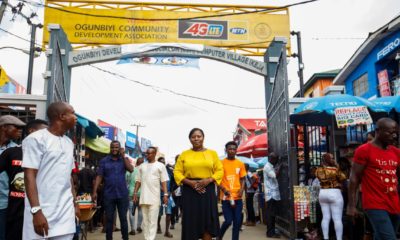Lagos State, with a population of 25 million people and unique food security, has urged residents to embrace urban farming as one of the ways to attain food sufficiency.
To address this, the current administration in the state made food security an integral part of its T.H.E.M.E.S, an acronym for (Traffic Management and Transportation, Health and Environment, Education and Technology, Making Lagos a 21st Economy, Entertainment and Tourism and Governance and Security) Developmental Agenda of Making Lagos State a 21st Century Economy.
This is regarded as part of the efforts aimed at boosting food security and increasing access to affordable fresh food in the state.
The Lagos State Commissioner for Agriculture, Ms Abisola Olusanya, made this known while speaking at the official launch of Urban Agriculture organised by the Lagos State Agricultural Development Authority (LSADA), held at the Agency’s Training Centre in Oko-Oba, Agege.
The launch came at a time of steep increase in the prices of food across the country, as reported by Investors King.
Investors king earlier reported that residents in the West and East decried the high prices of tomatoes, pepper, onions, egg, chicken and other food items, compared to their counterparts in the Northern part of the country, who according to them are enjoying these items in large quantities at cheaper rates.
The Permanent Secretary of the Ministry, Mr. Hakeem Adeniji, who represented Olusanya at the launch, disclosed that the program is aimed at educating Lagos residents on how to practice urban farming despite the challenge of limited landmass being faced in different parts of the State.
Having a great number of people living in the state engage in urban agriculture will help address the over-reliance on food coming into the state, ensure food security, help in reducing the cost of food items among others.
In her words, she said, “Today’s event is a way of raising the consciousness of Lagosians to practice urban farming in their communities and compounds, as well as using any available space in their building.”
She also sensitized them on using waste buckets, waste tires or waste bags filled with soil to plant some edible vegetables, saying little vegetables planted for household use will add to the agricultural production availability in the State.
The Commissioner noted that urban farming will add to food production, increase access to fresh agricultural products, reduce pressure on food products within the State and stabilise the prices of produce in the markets, explaining that Urban Farming also has the potential to nourish farming households, communities and create economic opportunities among the residents.
She also said, “Urban farming helps stimulate the local economy through job creation, income generation and growth of small businesses. More importantly, urban farming makes fresh food more affordable. It is fast becoming an important component of a city’s food system.’’
The Programme Manager of LSADA, Dr Olamilekan Pereira-Sheteolu, said the launch was to enlighten Lagos residents on the need to engage in urban farming, adding that it will create food security, guarantee zero hunger, reduce poverty and increase income generation.
While maintaining that the launch came at a time of steep increase in the prices of food across the country, Pereira-Sheteolu stated that the Agency will publicise a phone number that people can call for assistance on urban farming in their respective areas.
He stated, “We will seek the approval of the State Governor so that we can assist the people with things like seedlings and show them how to plant vegetables and fruits among others. This is our plan for the next phase of urban agriculture in Lagos State.’’

 Forex4 weeks ago
Forex4 weeks ago
 Naira3 weeks ago
Naira3 weeks ago
 Billionaire Watch3 weeks ago
Billionaire Watch3 weeks ago




 Naira3 weeks ago
Naira3 weeks ago








 Naira3 weeks ago
Naira3 weeks ago


 Naira2 weeks ago
Naira2 weeks ago








 Naira2 weeks ago
Naira2 weeks ago








 Naira4 weeks ago
Naira4 weeks ago
























